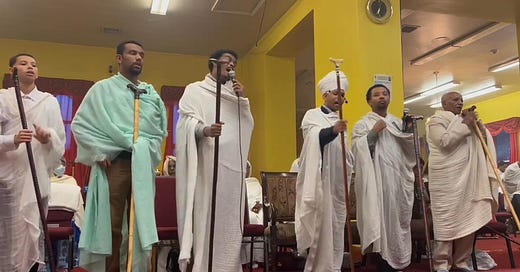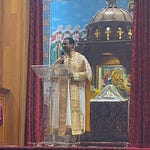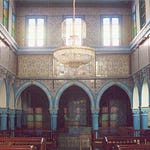መዝሙር ፵ወ፬
ጐሥዐ ፡ ልብየ ፡ ቃለ ፡ ሠናየ ፡ አነ ፡ አየድዕ ፡ ግብርየ ፡ ለንጉሥ ፤ ከመ ፡ ቀለመ ፡ ጸሓፊ ፡ ዘጠበጠበ ፡ ይጽሕፍ ፡ ልሳንየ ። ይሤኒ ፡ ላሕዩ ፡ እምውሉደ ፡ እጓለ ፡ እመሕያው ፡ ተክዕወ ፡ ሞገስ ፡ እምከናፍሪከ ፤ በእንተዝ ፡ ባረከከ ፡ እግዚአብሔር ፡ ለዓለም ። ቅንት ፡ ሰይፈከ ፡ ኀይል ፡ ውስተ ፡ ሐቌከ ፤ በሥንከ ፡ ወበላሕይከ ። አርትዕ ፡ ተሠራሕ ፡ ወንገሥ ፡ በእንተ ፡ ጽድቅ ፡ ወርትዕ ፡ ወየዋሃት ፤ ወይመርሐከ ፡ ስብሐተ ፡ የማንከ ። አሕጻከ ፡ ስሑል ፡ ኀያል ፡ አሕዛብ ፡ ይወድቁ ፡ ታሕቴከ ፤ ውስተ ፡ ልቦሙ ፡ ለጸላእተ ፡ ንጉሥ ። ወንበርከ ፡ እግዚኦ ፡ ለዓለመ ፡ ዓለም ፤ በትረ ፡ ጽድቅ ፡ በትረ ፡ መንግሥትከ ። አፍቀርከ ፡ ጽድቀ ፡ ወዐመፃ ፡ ጸላእከ ፡ በእንተዝ ፡ ቀብአከ ፡ እግዚአብሔር ፡ አምላክከ ፤ ቅብአ ፡ ትፍሥሕት ፡ እምእለ ፡ ከማከ ። ከርቤ ፡ ወቀንአተ ፡ ወሰሊኆት ፡ እምነ ፡ አልባሲከ ፤ እምክቡዳነ ፡ አቅርንት ፡ ዘእምኔሆሙ ፡ አስተፈሥሓከ ፡ አዋልደ ፡ ነገሥት ፡ ለክብርከ ፤ ወትቀውም ፡ ንግሥት ፡ በየማንከ ፡በአልባሰ ፡ ወርቅ ፡ ዑጽፍት ፡ ወሑብርት ። ስምዒ ፡ ወለትየ ፡ ወርእዪ ፡ ወአፅምዒ ፡ እዝነኪ ፤ ወርስዒ ፡ ሕዝበኪ ፡ ወቤተ ፡ አቡኪ ። እስመ ፡ ፈተወ ፡ ንጉሥ ፡ ሥነኪ ፤ እስመ ፡ ውእቱ ፡ እግዚእኪ ። ወይሰግዳ ፡ ሎቱ ፡ አዋልደ ፡ ጠሮስ ፡ በአምኃ ፡ወለገጽኪ ፡ ይትመሀለሉ ፡ ኵሎሙ ፡ አሕዛብ ፡ ብዑላነ ፡ ምድር ። ኵሉ ፡ ክብራ ፡ ለወለተ ፡ ንጉሥ ፡ ሐሴቦን ፤ በዘአዝፋረ ፡ ወርቅ ፡ ዑጽፍት ፡ ወሑብርት ። ወይወስዱ ፡ ለንጉሥ ፡ ደናግለ ፡ ድኅሬሃ ፤ ወቢጻሂ ፡ ይወስዱ ፡ ለከ ። ወይወስድዎን ፡ በትፍሥሕት ፡ ወበሐሤት ፤ ወያበውእዎን ፡ ውስተ ፡ ጽርሕ ፡ ንጉሥ ። ህየንተ ፡ አበዊኪ ፡ ተወልዱ ፡ ለኪ ፡ ደቂቅ ፤ ወትሠይምዮሙ ፡ መላእክተ ፡ ለኵሉ ፡ ምድር ። ወይዘከሩ ፡ ስመኪ ፡ በኵሉ ፡ ትውልደ ፡ ትውልድ ፤ በእንተዝ ፡ ይገንዩ ፡ ለከ ፡ አሕዛብ ፡ እግዚኦ ፡ ለዓለም ፡ ወለዓለመ ፡ ዓለም ።
My heart is inditing a good matter: I speak of the things which I have made touching the king: my tongue is the pen of a ready writer. Thou art fairer than the children of men: grace is poured into thy lips: therefore God hath blessed thee for ever. Gird thy sword upon thy thigh, O most mighty, with thy glory and thy majesty. And in thy majesty ride prosperously because of truth and meekness and righteousness; and thy right hand shall teach thee terrible things. Thine arrows are sharp in the heart of the king's enemies; whereby the people fall under thee. Thy throne, O God, is for ever and ever: the sceptre of thy kingdom is a right sceptre. Thou lovest righteousness, and hatest wickedness: therefore God, thy God, hath anointed thee with the oil of gladness above thy fellows. All thy garments smell of myrrh, and aloes, and cassia, out of the ivory palaces, whereby they have made thee glad. Kings' daughters were among thy honourable women: upon thy right hand did stand the queen in gold of Ophir. Hearken, O daughter, and consider, and incline thine ear; forget also thine own people, and thy father's house; So shall the king greatly desire thy beauty: for he is thy Lord; and worship thou him. And the daughter of Tyre shall be there with a gift; even the rich among the people shall intreat thy favour. The king's daughter is all glorious within: her clothing is of wrought gold. She shall be brought unto the king in raiment of needlework: the virgins her companions that follow her shall be brought unto thee. With gladness and rejoicing shall they be brought: they shall enter into the king's palace. Instead of thy fathers shall be thy children, whom thou mayest make princes in all the earth. I will make thy name to be remembered in all generations: therefore shall the people praise thee for ever and ever. (Psalm 45, according to the Masoretes)
I have been obsessively watching this particular video, and the several other fine cuts and precious gems on the channel of Dcn. daweet girma; accompanied here by his fellow-laborer in Jaredian hymns Dcn. mihret melaku, who wrote our featured article on the etiquette and order of tsome dgwa, and their choirmaster the aptly named (perhaps a little too aptly) Prof. yaréd. They say, melak sim yaweTal, messengers (angels) select names. But sometimes, in the traditional schools of the EOTC, name changes happen to suit and fit the character of the person, and especially to baptize the at-times very gangster given names of some otherwise Orthodox christians.
In this video, you can watch and hear an entire psalm of daweed sung in a semitic tongue, dovetailed by at least two different traditions (teklé and gwenderine) of walking-stick choreography. During this season this historic St. Michael’s parish (where Malcolm X and MLK Jr. once walked) in Boston, MA, halfway through the Great Fast, has done ten full psalms in this manner. Were they in the homeland, and at a fully-armed and operational parish, they would do this with one hundred psalms…
Reminds me of the New Jerusalem, the Zion which is above.
This particular psalm is germane to our tradition, because it has been altered and edited to address our Lady the Holy Virgin Mary, instead of the Most High God, in the Anaphora of Mary. This is a controversial step. And should cause us to at least pause, ponder, and reflect. I remain functional in thinking and doing. Maybe it’s the right move. Maybe it’s not. But in our ‘yes and’ culture of Orthodoxy, we have the edited version in the Anaphora of Mary, and the original version in a misbak (psalm chanted during the eucharistic liturgy), and here chanted from the noneucharistic Jaredian book miiraf (resting place).
Glory to God, for all things.












Share this post